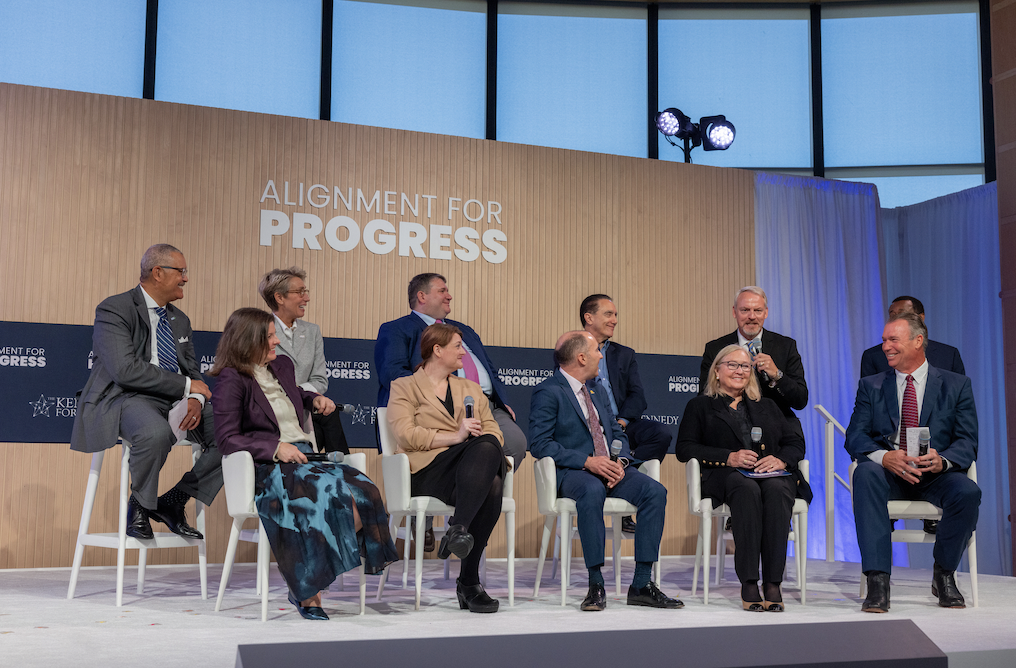
11 CEOs of the CEO Alliance for Mental Health in discussion at the Alignment for Progress Conference on October 3-4, 2023.
Thank you to everyone who traveled to Boston last week to attend the Alignment for Progress (A4P) Conference and officially launch the Alignment for Progress Movement. The collective passion and commitment in the room was inspiring and will undoubtedly help us achieve our 90/90/90 goals: By 2033 90% of all individuals will be screened for mental health and substance use disorders, 90% of those screened will be able to receive evidence-based treatment, 90% of those receiving treatment will be able to manage their symptoms in recovery.
So What’s Next?
In 2024, The Kennedy Forum will convene two special committees to investigate structural obstacles to transforming our mental health/substance use disorder systems of care. The first will address the workforce crisis; we are aligning closely with The White House to develop that committee’s workplan. The second will take on challenges related to data and measurement-based care and will be co-chaired by Nawal Roy, CEO & President of Holmusk and Caroline P. Carney, President of Magellan Behavioral Health & Chief Medical Officer of Magellan Health. Both committees are in the early stages of development, and we will keep you informed as their work progresses.
With partners, we’ve created three important tools that members of the community can leverage to help us move toward achievement of 90/90/90 by ‘33:
The National Strategy for Mental Health and Substance Use Disorders is the first ever digital compilation of federal policy recommendations designed to transform our mental health and substance use case system. It focuses on all major areas affecting Americans’ mental health, such as health coverage, the delivery system, youth mental health, community supports, the criminal legal system, and social determinants of health. There are currently more than 220 recommendations and expect it will grow as the community provides feedback. Find a policy recommendation to champion here.
In partnership with McKinsey Health Institute, we present our mental health and addiction systems map. This systems map is an open access, online, interactive tool designed to help you think holistically about critical issues related to the mental health and substance use care delivery system in our country. Explore the map here (you will be asked to complete a brief form first) to deepen your understanding of current stakeholders and identify potential opportunities for activating new partners or engaging stakeholders differently.
KPMG and The Kennedy Forum partnered to create a ZIP code level mapping tool which offers visualizations of claims data around mental health and substance use care across the country. The tool uses many different data sources to develop visualizations that will help you:
- Understand the incidence of mental health and substance use across counties and ZIP codes
- Identify service deserts/gaps to determine where additional healthcare resources should be allocated
- See usage of different treatment methods across states and counties
We encourage you to use this tool to think through policy implications, future allocations of resources in by geographic areas and also sets a bar for where additional growth and investment in data collection and validation are needed. Click here to dive in (email authentication is required).
We also recommend reviewing these key resources from our partner organizations:
The Mental Health Index from One Mind at Work provides a data-driven assessment and generates strategic guidance for improvement in 10 key organizational categories that are foundational and closely linked to workforce mental health.
The National Council for Mental Wellbeing presents CCBHCs: A Vision for the Future of Community Behavioral Health Care. Download to learn how the CCBHC model can be leveraged by clinics, policymakers, partner organizations and the private sector to re-think access to mental health and substance use treatment and care in America.
More Ways to Get Involved in the Alignment for Progress Movement:
At the Alignment for Progress Conference we proudly presented 72 commitments made by diverse stakeholders. We invite your organization to join these 72 and make a commitment today! To do so, please send The Kennedy Forum one goal that your organization is working towards, which we can publicly elevate and disseminate through our Alignment for Progress communication channels. You can select a goal from your strategic plan or other organizational guiding documents that will drive meaningful change within the MH/SUD system. When possible, SMART (specific, measurable, achievable, realistic, and time-bound) goals are preferred. This should be something that you aim to accomplish over the next five years.
Please contact Kate.Clark@TheKennedyForum.org with any questions. You can submit a commitment here.
We are grateful to be your partners in this movement and look forward to achieving progress together. Onwards!


